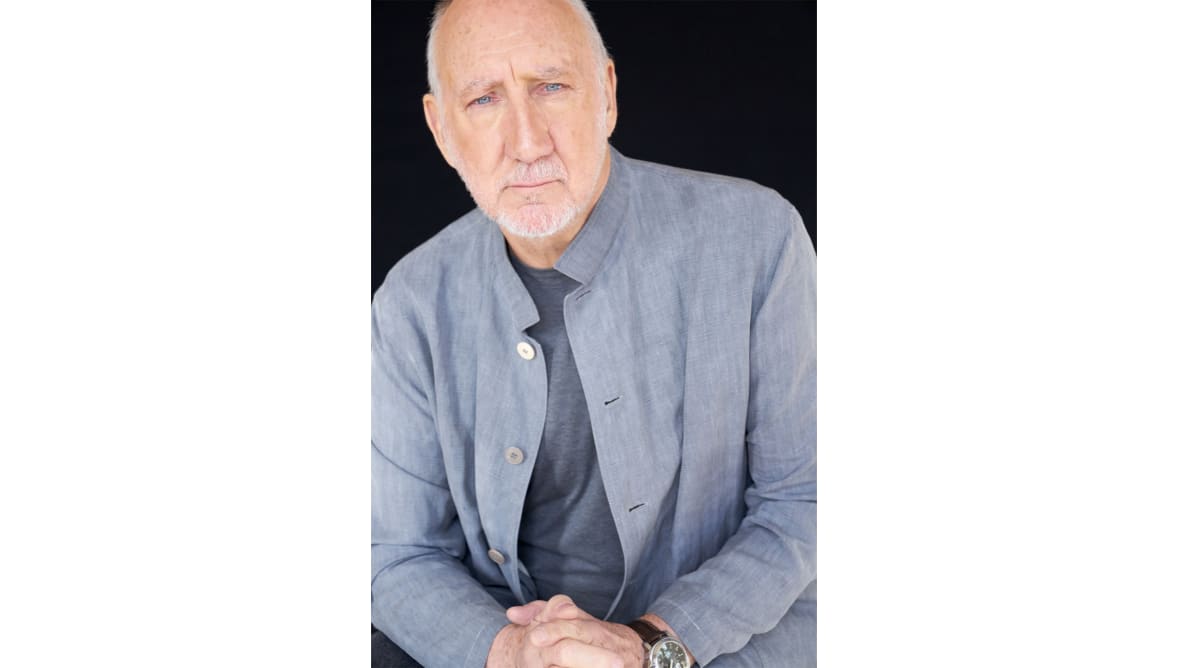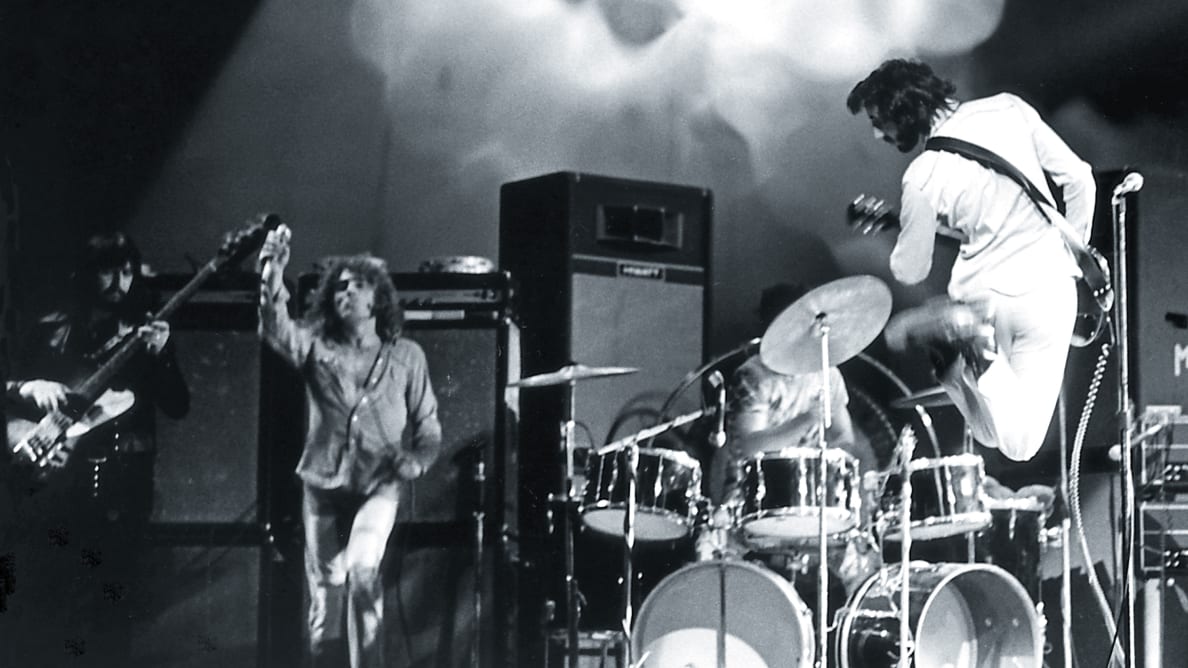Who’s Next is one of the greatest rock ’n’ roll albums, a record of The Who at the peak of their considerable powers.
Sure, My Generation may have been the first punk album—a decade and a half ahead of its time—and The Who Sell Out helped and other things that trickled out over the years. Do you look back on Life House and think it’s “the one that got away”? Or are you able to reconcile things now because you were able to make one of the truly great albums of the era, out of all the chaos? Because Glyn Johns writes in his book that, even as late as when you brought him on as producer, you gave him not just the demos, but the script for Life House. So you hadn’t given up on it quite yet.
No, definitely. I was still hoping for a double album. It was a tough time. But it was also a very important lesson for me. I’d given up on the idea of working with Kit, which was a very big thing. I still had the band, and the band was still behind me. When Glyn took over, I was hoping that Glyn would make a double album. That was all. That’s why I gave him the script. And I sat down with him before, and he said, “I really don’t understand this at all.” And I just remember saying to him, “Listen. I hope you don’t feel I’m insulting you, but you really don’t fucking need to. This is my project. Just do what you do.” I didn’t think that we would get to the end of the project and he would decide that the double album was going to be a single album and leave off “Pure and Easy.” I remember thinking that was like leaving fucking “Amazing Journey” off Tommy! It’s the song that sets the scene; that gives the other songs a backbone.
And “Pure and Easy” is absolutely on par with “Baba O’Riley” and “Behind Blue Eyes” and “Bargain” and “Won’t Get Fooled Again.”
Well, it’s certainly on par with “Song Is Over.” Glyn chose “Song Is Over” instead because it was a good closer to the album. He wasn’t thinking about Life House, he was thinking about a bunch of songs, and he made his decisions based on that. But I decided to trust his instincts and his intuition, because by the time we got to the end of the recording, it was clear that Kit was gone for me, and that there was no way I was going to rescue the movie side of the project. And also, the idea that I might be able to do anything technological with the band had drifted into space. But remember, what we had invented was the use of backing tapes. And they fucking worked! That gave us this extra harmonic and musical implementation, because we were just a three-piece band. We didn’t even have a keyboard player. So it enriched our sound. And they worked so well partly because of Keith Moon. He didn’t need a click. He was the click!

Pete Townshend
Terry McGough
At the end of “Won’t Get Fooled Again,” during the San Francisco show included in the box set, you say something like, “Could be rock ’n’ roll, maybe not.” You’d just played a whole bunch of then-new material, the Who’s Next material, to an American audience, and it’s a great performance. I’m sure you don’t remember saying that, but do you remember thinking that the songs or concept maybe weren’t rock ’n’ roll?
I think I’d switched. The Isle of Wight in 1970 was pivotal, because Bob Dylan came over to do the festival. You’d had Woodstock, you’d had Monterey, but we’d had no big festivals in the UK. So it was Dylan, The Who, and the Moody Blues. Dylan’s trip was socio-political folk, still; whatever you wanted to call it. That’s what he did there. Moody Blues were into angels and visions, mysticism, poetic stories about spirituality. And The Who were performing Tommy.
After the show, after the crowd was gone, what was left behind was this incredible expanse of garbage. I mean, it was just spectacular. The festival was only one fucking day. Just unbelievable. And I got our road crew to clean it up. Because I was so ashamed of what had actually happened. And I suddenly thought, because I was working towards Life House, and about the importance of the audience, about trying to raise the audience up, to inspire them, to give them uplift, to make them connect to the realities of how art and politics, and art and society, could be improved, and also, if you like, all under the umbrella of Sufi-spiritualism. Spirituality, not -ism. And here was this example of how little they fucking cared about it. What then happened was I modified my position, and I became more interested in the technology that underlay what electronic music was promising.
I remember having lunch with you in 2000, after The Lifehouse Chronicles and the Sadler’s Wells shows, and saying that, in that moment at least, the technology had caught up to your ideas. The Who, at that time, were really on fire. And I said to you that Life House felt like a piece that you could then do and have it be understood. Now, 50-some-odd years on from the germ of the Life House idea, not only has the technology caught up, but the culture has caught up. Plus, there’s an autocratic explosion going on around the world that I’ve always seen as part of the Life House story. Did it ever feel to you, putting together the box set, writing your liner notes, reading the liner notes that other people had written, and the graphic novel, that maybe now is the time to revisit it as a full piece?
No. I don’t think so. I think the possibility now is that the graphic novel might lead to a movie, which will be good, it would be fun. But I think the idea of building an argument, a debate about how people in power wish to use the arts and popular music is a fucking touchy subject, rooted in the fact that musicians, across the board, are like the rest of the populous: polarized into two groups, left and right. There seems to be very little middle.
“[Roger] is still on the right side and I’m on the left side, both in politics and on spiritual matters. And pretty much just life in general.”
Plus, in the intervening 20-odd years, we have seen that technology, which we all want to be great, can also be awful. I think that’s the thing that, when I was digging back into Life House, and thinking back to our conversations—and what I know about it, what I’ve read about it, what I’ve imagined about it—is that this good-and-evil part of the technology aspect dovetails into the story very neatly.
I understand you, but I do think also that we need to accept that what’s actually happened with technology, with respect to virtual reality, to communication, is that it’s dividing people into chunks: influencers and followers. And influencers can be musicians. Taylor Swift has her Swifties, for instance. “Teeny boppers” was what Ringo called the Beatles fans. So it’s nothing new. But I think that while we have the technology now to do some of the stuff that Life House is about, what we don’t have is the revolution. We are subjugated. We are suborned. We are all in front of our laptops, with music on our phone. We cling onto our iPhones, and we wonder how we could live without them.
So I think, yes, the technology is nearly there, but what has arrived has already been manipulated and corrupted by money people. All of these billionaire leaders of New Tech are so rich that they could save the world if they wanted to. I don’t know why they don’t, but they choose not to.
So I think what we’re looking at is the fact that there are these entities that get in the way all the time of the people and what the audience wants. I look at people on YouTube or Instagram or TikTok or Reddit, whatever, talking about what they do, and I don’t hear the truth anymore. I hear what they think is cool to do or to say, and sometimes they’re just trying to make money, but I think in a sense of machinery, somehow, we’ve become polarized not just into right and left politically, but also into groups and subgroups of people who only really communicate with each other, honestly, when they’re angry.
So what’s next for Life House and The Who and you as a solo artist?
I don’t know what’s next for Life House, except that a number of film companies and TV companies have seen the graphic novel. And that’s exciting, because they’re all now starting to get it. [laughing] I do feel that the art installation aspect of it is still potentially possible to imagine might take place. The new piece that I’ve been working on for a long time, Age of Anxiety, has an installation conversation aspect to it. So I probably will finish that, and if there are any AI software-based wonderments that come out of the new wave of technology and data manipulation, I’ll probably use them for that project. So, it’s still bubbling.
With respect to The Who, Roger’s got a bad knee which will probably need surgery, and so any decisions now about what we’ll do next, I don’t know. But he’s singing great. He’s still on the right side and I’m on the left side, both in politics and on spiritual matters. And pretty much just life in general. [laughing] But he’s a good guy and he’s working hard and we’re thinking we might try and pick up some of the territories that we’d missed with the orchestral show, but, you know, I’m 78. So I think we shall see what happens. I have to be careful what I say, because I don’t want to make this all about Roger’s fear of what is new, but I think he is afraid of what is new. [laughing] The way he expresses it is, “Pete, you’ve written so many fucking great songs.” He said, for example, “If we were to use your solo catalogue as part of The Who catalogue, we’d have the best fucking choice of stuff.” And already, we don’t have enough time in two and a half hours to play them. He does “Let My Love Open the Door” and he does “Blue, Red and Grey,” I think, in his solo shows. So, something might happen. But I don’t know.

